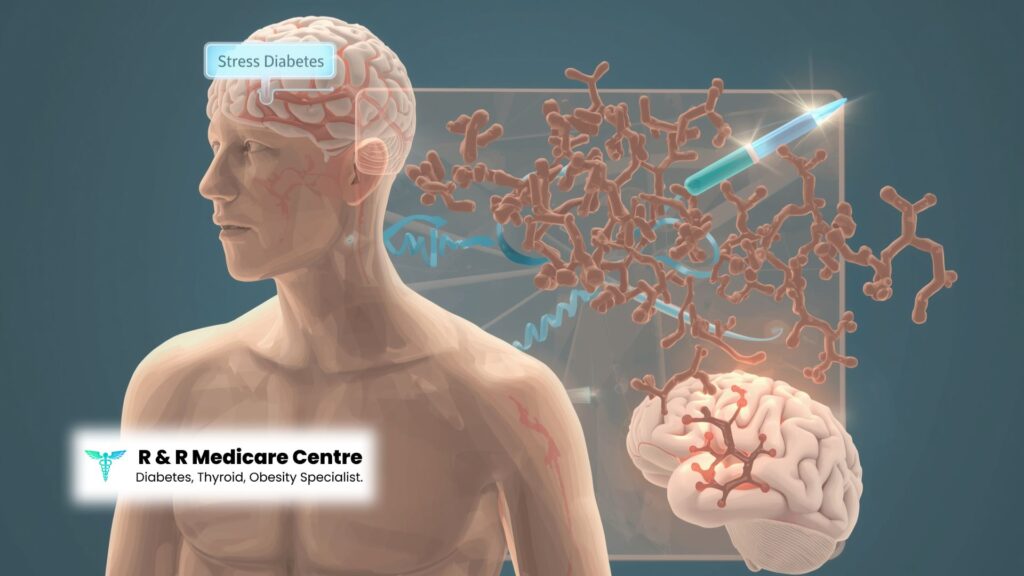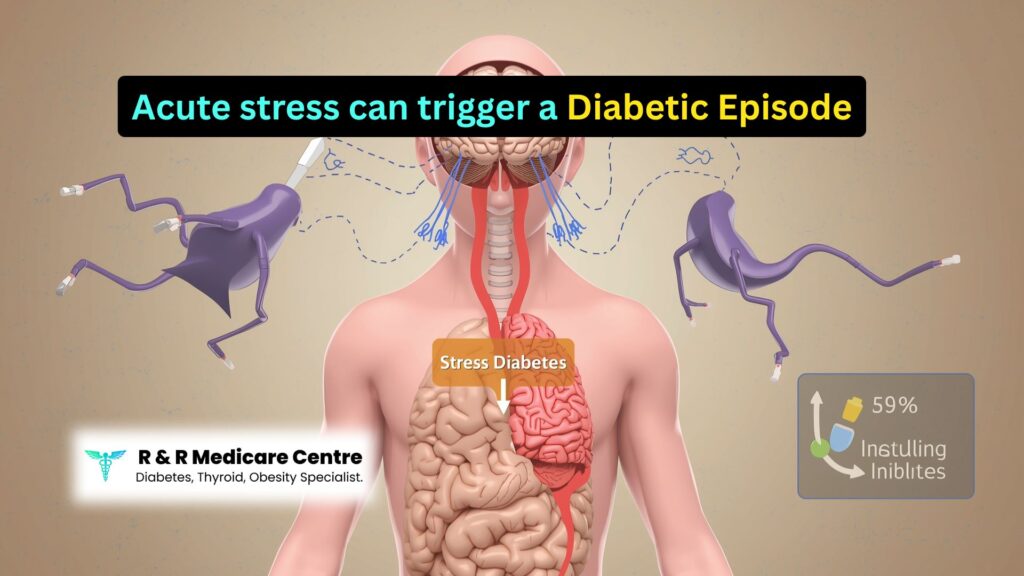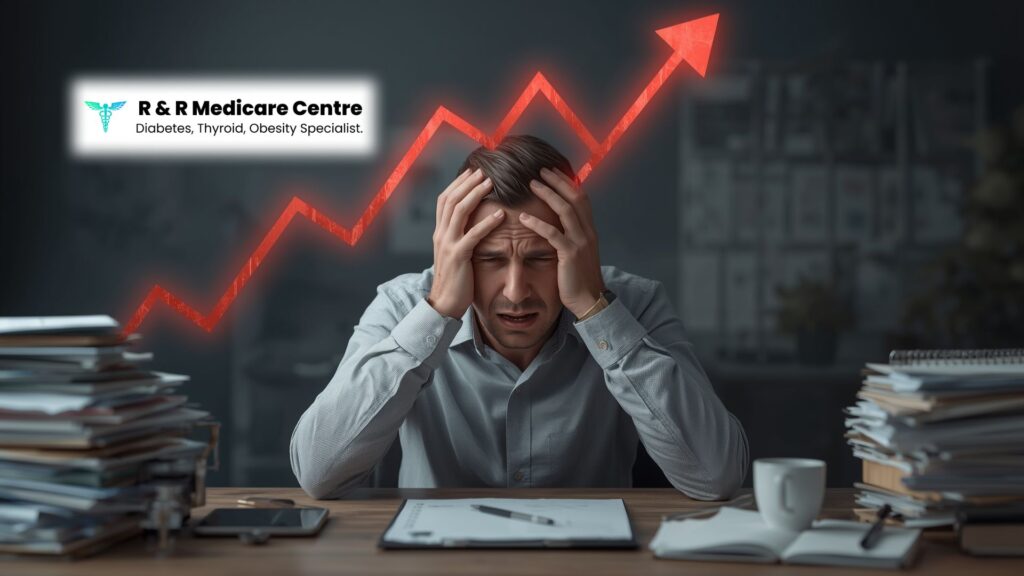In today’s fast-paced lifestyle, stress has become an inseparable part of our lives. However, chronic stress is not just a mental burden – it directly impacts our physical health, particularly in the case of stress diabetes. According to Dr. Abhishek Shrivastava, a leading endocrinologist in Jabalpur, stress diabetes is an emerging concern, especially in urban populations.
Let’s explore the concept of stress diabetes in detail and answer the most common questions people have about it.

What is Stress Diabetes?
Stress diabetes, also referred to as stress-induced hyperglycemia or stress-related type 2 diabetes, is a condition where chronic emotional or physical stress leads to elevated blood sugar levels. It may not initially start as full-blown diabetes, but over time, persistent stress can trigger hormonal imbalances that increase insulin resistance, leading to type 2 diabetes.
As explained by Dr. Abhishek Shrivastava, stress impacts the endocrine system – the system responsible for hormone regulation in the body. When stress hormones like cortisol and adrenaline are released in excess, they can disrupt insulin production and usage, raising blood glucose levels abnormally.
Can Stress Cause Diabetes?
Yes, stress can contribute to the development of diabetes, particularly type 2 diabetes. When you’re stressed, your body enters a “fight or flight” mode, releasing stress hormones that increase glucose in your bloodstream. This is your body’s way of providing energy to respond to a perceived threat. However, in modern life, where stress is persistent and not just occasional, this process can overload the body’s metabolic balance.
According to Dr. Abhishek Shrivastava, a trusted endocrinologist in Jabalpur, many patients with prediabetic conditions progress to full-blown diabetes due to unmanaged stress and poor lifestyle habits.

How to Reduce Stress Diabetes?
Reducing stress diabetes involves managing both your mental well-being and physical health. Here are some practical suggestions by Dr. Abhishek Shrivastava:
- Practice Yoga and Meditation: These help reduce cortisol levels and balance your mind-body connection.
- Exercise Regularly: Activities like cycling, swimming, and brisk walking help burn excess glucose and improve insulin sensitivity.
- Follow a Balanced Diet: Avoid processed sugars and carbs. Choose whole foods, fruits, and green vegetables.
- Get Enough Sleep: Lack of sleep increases stress hormones and affects glucose metabolism.
- Regular Health Check-ups: Early detection can prevent complications.
If you’re searching for expert advice, consult an experienced endocrinologist in Jabalpur like Dr. Abhishek Shrivastava, who can guide you with personalized diabetes care.
How Serious is Prediabetes?
Prediabetes is a warning sign. While not full diabetes, it indicates that your blood sugar levels are higher than normal and you’re at high risk of developing type 2 diabetes. Dr. Abhishek Shrivastava, renowned endocrinologist in Jabalpur, emphasizes that prediabetes should never be ignored. With the right lifestyle modifications, it’s completely reversible.
Left unchecked, however, prediabetes can silently progress into diabetes, increasing the risk of heart disease, kidney failure, and vision problems.

Can Stress Cause a Diabetic Episode?
Yes, acute stress can trigger a diabetic episode, especially in people with poorly managed blood sugar. A diabetic episode could mean sudden hyperglycemia (high blood sugar) or even hypoglycemia (low blood sugar) due to irregular insulin activity. Stress affects your eating habits, sleep patterns, and physical activity – all of which are key diabetes management factors.
Dr. Abhishek Shrivastava, experienced endocrinologist in Jabalpur, advises patients to closely monitor their blood sugar during periods of stress and avoid skipping meals or medications.
What is Stress Type 2 Diabetes?
Stress type 2 diabetes refers to type 2 diabetes primarily caused or worsened by chronic stress. Unlike type 1 diabetes, which is usually genetic and results from the pancreas producing no insulin, type 2 is often triggered by lifestyle factors. Prolonged stress leads to insulin resistance, where your cells no longer respond properly to insulin.
According to Dr. Abhishek Shrivastava, stress type 2 diabetes is increasingly common in working professionals and younger populations due to inactive lifestyle, mental pressure, and irregular routines. As a leading endocrinologist in Jabalpur, he often treats patients whose blood sugar spikes without traditional causes – stress being the silent culprit.
What is Oxidative Stress in Diabetes?
Oxidative stress refers to the damage caused by free radicals (unstable molecules) in the body. In people with diabetes, high blood sugar increases oxidative stress, which can harm cells, tissues, and vital organs.
Dr. Abhishek Shrivastava explains that oxidative stress plays a significant role in diabetes complications like neuropathy (nerve damage), nephropathy (kidney disease), and retinopathy (eye damage). Managing blood sugar, eating antioxidant-rich foods, and reducing stress can lower oxidative stress levels effectively.

Can Stress Raise Blood Sugar Immediately?
Yes, stress can cause an immediate spike in blood sugar levels, even in non-diabetic individuals. This is due to the release of cortisol and adrenaline, which signal the liver to release more glucose into the bloodstream. People with diabetes or prediabetes should be especially cautious during emotional upheaval or physical stress like illness or injury.
That’s why Dr. Abhishek Shrivastava, a respected endocrinologist in Jabalpur, recommends stress management as an essential part of diabetes care, not just an optional lifestyle choice.
What Happens During Stress Hyperglycemia?
Stress hyperglycemia is a temporary rise in blood sugar that occurs during periods of acute stress – such as surgery, trauma, infections, or emotional breakdowns. It can happen even in people without diabetes. However, if left unmanaged, it increases the risk of developing permanent glucose intolerance.
During such episodes, your body produces excess glucose and reduces insulin sensitivity – leading to dangerously high blood sugar. Dr. Abhishek Shrivastava treats such patients regularly and highlights the need for prompt diagnosis and treatment.
